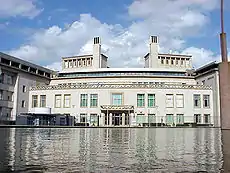| UN Security Council Resolution 1104 | ||
|---|---|---|
 Front of the ICTY building | ||
| Date | 8 April 1997 | |
| Meeting no. | 3,763 | |
| Code | S/RES/1104 (Document) | |
| Subject | Tribunal (Former Yugoslavia) | |
Voting summary |
| |
| Result | Adopted | |
| Security Council composition | ||
Permanent members | ||
Non-permanent members | ||
| ||
United Nations Security Council resolution 1104, adopted unanimously on 8 April 1997, after recalling 808 (1993) and 827 (1993) and considering the nominations for Judges of the International Criminal Tribunal for the former Yugoslavia received by the Secretary-General Kofi Annan by 13 March 1997, the council established a list of candidates in accordance with Article 13 of the Statute of the International Tribunal to be forwarded to the General Assembly.[1]
The list of nominations was as follows:
- Masoud Mohamed Al-Amri (Qatar)
- George Randolph Tissa Dias Bandaranayake (Sri Lanka)
- Antonio Cassese (Italy)
- Babiker Zain Elabideen Elbashir (Sudan)
- Saad Saood Jan (Pakistan)
- Claude Jorda (France)
- Adolphus Godwin Karibi-Whyte (Nigeria)
- Richard George May (United Kingdom)
- Gabrielle Kirk McDonald (United States)
- Florence Ndepele Mwachande Mumba (Zambia)
- Rafael Nieto Navia (Colombia)
- Daniel David Ntanda Nsereko (Uganda)
- Elizabeth Odio Benito (Costa Rica)
- Fouad Abdel-Moneim Riad (Egypt)
- Almiro Simtes Rodrigues (Portugal)
- Mohamed Shahabuddeen (Guyana)
- Jan Skupinski (Poland)
- Wang Tieya (China)
- Lal Chand Vohrah (Malaysia)
11 of the 19 nominations would be elected to the Court.[1]
See also
References
- 1 2 "Security Council forwards to General Assembly 19 nominations for International Criminal Tribunal for former Yugoslavia". United Nations. 8 April 1997.
External links
 Works related to United Nations Security Council Resolution 1104 at Wikisource
Works related to United Nations Security Council Resolution 1104 at Wikisource- Text of the Resolution at undocs.org
This article is issued from Wikipedia. The text is licensed under Creative Commons - Attribution - Sharealike. Additional terms may apply for the media files.